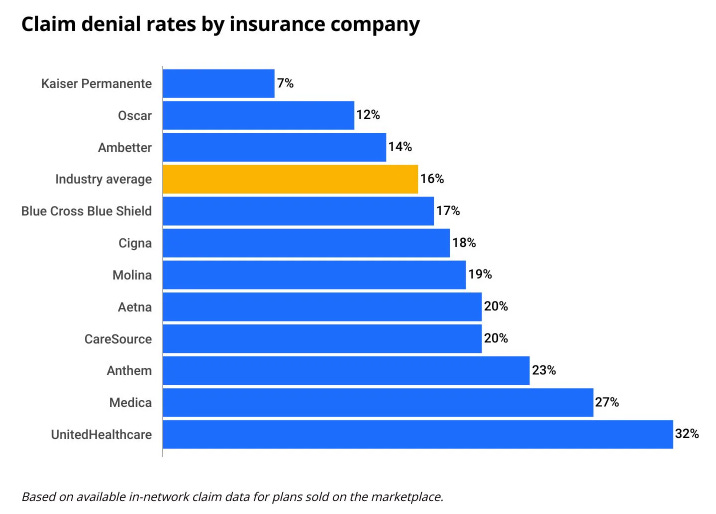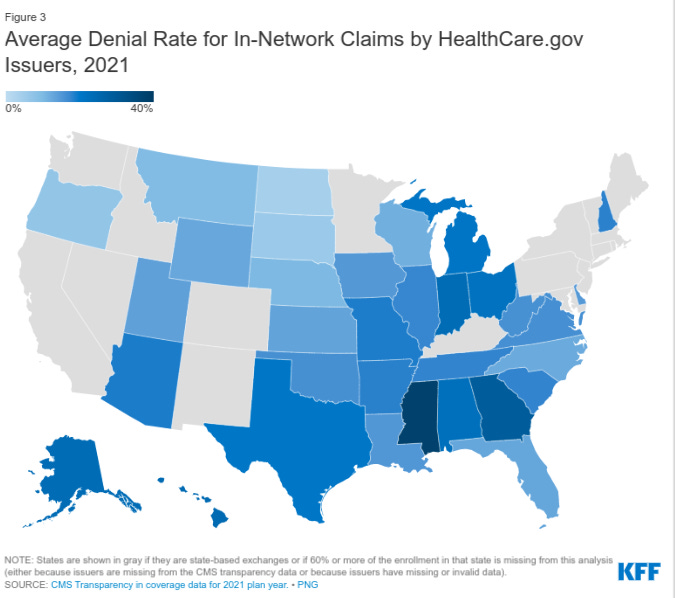A Good Day To Advocate for Better Healthcare
If there are subjects you’d like to see or improvements made, please let me know using the comment button below. One story in work is about the availability of psychiatric beds and what happens when there are none to be had,.
Videos of these newsletters appear on Youtube on this channel. They are on hold until early July.
Dobbs Two Years On
Today is the two year anniversary of the Dobbs decision that struck down a woman’s right to an abortion in the US.
ACTION
Use RESISTBOT by texting SIGN PQJCSE to 50409 to send this message to your Member of Congress and Senators. (Chop Wood/Carry Water)
“I am your constituent and it’s the two-year anniversary of the Dobbs decision, and I’m writing to say that I’m disgusted by what’s happened to our country since then. Our maternal mortality rates are getting worse. 171,000 women had to travel out of state last year to get the reproductive healthcare they needed. Women are being turned away from emergency rooms. Doctors are being threatened with prosecution for doing their jobs. 64,000 women across the country have been forced to carry their rapists pregnancies to term. It’s a disaster. I want the Senate to pass S. 701 and the House to pass H.R. 12, the Women’s Health Protection Act now. Politicians shouldn’t be controlling what we do with our bodies. If they can’t understand that then we will vote them out in November.”
Major Cancer Study in the UK
The UK's National Health Service (NHS)—in partnership with biotechnology company BioNTech SE and hospitals across the country—is to grant thousands of patients with cancer in England fast-track access to trials of personalized cancer vaccines.
The vaccines being tested as part of the trials aim to help patients with different types of cancer and, if successfully developed, researched and approved, cancer vaccines could become part of standard care.
This technology pioneers the use of mRNA-based vaccines to sensitize people’s immune system and in turn detect and target cancer at its earliest stages. The cancer vaccines under evaluation in the colorectal cancer trial are based on a molecule called mRNA, the same technology used for the COVID-19 vaccine.
They’re created by analyzing a patient’s tumor to identify mutations specific to their own cancer. Using this information, medics can create an individualized cancer vaccine.
The developmental vaccines are designed to induce an immune response that may prevent cancer from returning after surgery by stimulating the patient’s immune system to specifically recognize and potentially destroy any remaining cancer cells. (Cancer Research UK)
Insurance Denials
Health Insurance companies are fond of saying that they don’t determine treatment, just what they will pay for (or not). You are free to have whatever treatment you see fit - but - you may have pay for it.
The world of insurance claims and denials is particularly ugly. Part of the reason is that insurance companies keep a fair portion of the money they take in as premiums invested. Usually, the longer the money is invested the more money they make. Paying claims reduces the amount invested.
Sometimes when a medical provider plans to treat you, they submit a request for prior authorization to your insurance company. As the name implies, it is a good faith statement of how much of the planned procedure’s costs your insurance will cover. Sometimes, insurance companies just receive claims after treatment and outright refuse to pay.
If an insurance company is not in business to make money, one might guess that their claims denial rate was lower. And you would be right. Traditional Medicare’s denial of claims rate ins 1.4% (NIH)
How about Affordable Care Act Plans? Here are some that were reported by insurers for the 2021 plan year and posted in a public use file in October 2022. We find that, across HealthCare.gov insurers with complete data, nearly 17% of in-network claims were denied in 2021. Insurer denial rates varied widely around this average, ranging from 2% to 49%.
The government’s Center for Medicare and Medicaid Services (CMS) requires insurers to report the reasons for claims denials at the plan level. Of in-network claims, about 14% were denied because the claim was for an excluded service, 8% due to lack of preauthorization or referral, and only about 2% based on medical necessity. Most plan-reported denials (77%) were classified as ‘all other reasons.’
Here is a set of more recent denial rates from value penguin
If you want a view of denial rates by state (not as useful IMHO) check the chart below from the Kaiser Family Foundation. The darker the color, the higher the rate. States that are colored grey have insufficient data available or employ a state marketplace instead of using the US government’s marketplace.
Medicaid Denials Also an Issue
A Managed Care Organization is a form of prepaid health insurance like an HMO. Medicaid managed care organizations (MCOs) deliver care to more than two-thirds of all Medicaid enrollees nationally. Managed care plans often require patients to obtain approval of certain health care services or medications before the care is provided. While Medicaid MCOs may limit services based on medical necessity or utilization management tools federal rules specify services must be no less (in amount, duration, and scope) than offered under fee-for-service and MCOs cannot arbitrarily deny or reduce a required service based solely on an enrollee’s illness or condition.
The department of Health and Human Services Office of Inspector General, investigated the prior authorization denial rate for Medicaid Managed Care Organizations. The report was written during the Trump administration using 2019 data and they found that the prior authorization denial rate was 12%, about one out of every 8. Worse, they found that of the 115 MCOs examined, 12 had prior authorization denial rates greater than 25 percent—twice the overall rate.
But wait, there’s more -Despite the high number of denials, most State Medicaid agencies reported that they did not routinely review the appropriateness of a sample of MCO denials of prior authorization requests, and many did not collect and monitor data on these decisions. - So they don’t even care to see how appropriate the care they pay for is administered. For reference - here is the IGs report and here is a news report on the subject by KFF.
State Based Data
An informed consumer will tend to make choices in their own best interest. If you or your employer had to purchase a health insurance plan you might want to know what the claims denial and prior authorization denial rates were before purchasing. I would.
I contacted my insurance commissioner in Washington State and asked for the data. They told me that in some form or other they have it but it is private to the individual companies and cannot be shared.
I tried freedom of information requests to any number of other states and was met by a similar response. Either we don’t have the data or you can’t have it. At last look, Utah was cooperative and they gave me a link to a website where they publish the data.
The system is bollixed up because those that pay claims have an incentive to not pay them.
We have seen that when a national insurance trust is responsible the denial rates are a little over 1% (Traditional Medicare). When the commercial world is involved it can be as high as 49% and one of the larger insurers (United Health) is over 30%
We can let our state representatives know we want health insurance claims denial rates and prior authorization denial rates made publicly available so we can be better consumers. BTW if the data is widely available in public, I believe we will see a drop in denials. This is the public shame factor.
Of course, a single payer universal healthcare system would have lower rates - we have evidence.
Action - State Level (Not Utah)
Use RESISTBOT on your cell phone by texting SIGN PGZIMF to 50409 to tell your governor, state representatives, and state senators that we want health insurance claims denial data made public. You can share this page.
“I am your constituent. We need to be better consumers when it comes to purchasing health insurance and you can help. Our state is not publishing the claims denial rates for each insurer licensed to do business in the state. Some insurers have denial rates as high as 49%. Who wants to buy that insurance? Help us and pass legislation that directs the insurance commissioner to publish claims and prior authorization denials and reasons for denials yearly for each insurer licensed in our state. We want to be good consumers but without this data we are hampered. Thank you.”
Action - Federal
Use RESISTBOT on your cell phone by texting SIGN PQZGCH to 50409 to tell your Congressperson and Senators about claims denial rates and what they can do about it. Here is the message.
“I am your constituent and I want you to know two things - first - Traditional Medicare, a national single payer insurance trust, has a claims denial rate of about 1.2%. Next I want you to know that commercial health insurance has claims denial rates that are out of control. Medicaid run by managed care organizations averages 12%, Affordable Care Act plans have denial rates from 7% to way over 30%. This is crazy. We need you to pass a national single payer universal healthcare law now so that so many of us do not have our doctor’s treatments for us denied. HR 3421 is such a bill. Get on it.”
If Your Claim Was Denied
Here is a reference for what to do if your claim was denied (Value Penguin). Scroll down to the section on how to dispute your claim. Here are two links from our reference section below on claims denials and negotiating with hospitals.
Appeal a Healthcare Decision, Appeal/Negotiate a Hospital Bill
There is one more thing to consider - if your claim was denied, most states will execute an independent review of the claim to determine if the insurance company needs to pay. Check your state’s insurance commissioner web page. You can find them here.
Resources
Find My Elected Officials
Contact State and Federal Representatives - phone and email
Healthcare Advocacy (Us) Website
Our Newsletter resources including reproductive healthcare - Healthcare Advocacy Reading List
Important Healthcare Resources
League of Women Voters Healthcare Reform Toolkit
Organizations to Contact
National Nurses United Medicare4All
Physicians for a National Health Program
One Payer States
Healthcare Now
Reproductive Health
NARAL - Pro Choice America
Charley. chatbot abortion resource - make sure to use a secure incognito browser if you live in a state that has banned abortion
Planned Parenthood
Miscarriage and Abortion Hotline has references about where to procure abortion medications. They also assist women in the process of self managed abortion or miscarriage by phone or text and will respond in an hour. Details and hours of operation at their website.
United State of Women Reproductive health page (bottom of the page) has important resources such as medical support, access to Telehealth, prescriptions by mail, and legal support references.
Practice careful communications - The Digital Defense Fund has a number of tips to keep texts, calls, and internet use private. Here is their site.
If you need financial help with an abortion try abortionfunds.org
Claims Denials and Appeals & What to Do
Appeal a Healthcare Decision
Appeal/Negotiate a Hospital Bill
Disinformation Management
Cybersecurity Infrastructure Security Agency
Save Democracy
Chop Wood, Carry Water by Jessica Cravens
RESISTBOT
Link to the RESISTBOT site to learn more
Link to Chop Wood, Carry Water RESISTBOT write up
Thanks for reading Healthcare Advocacy! Subscribe for free to receive new posts






